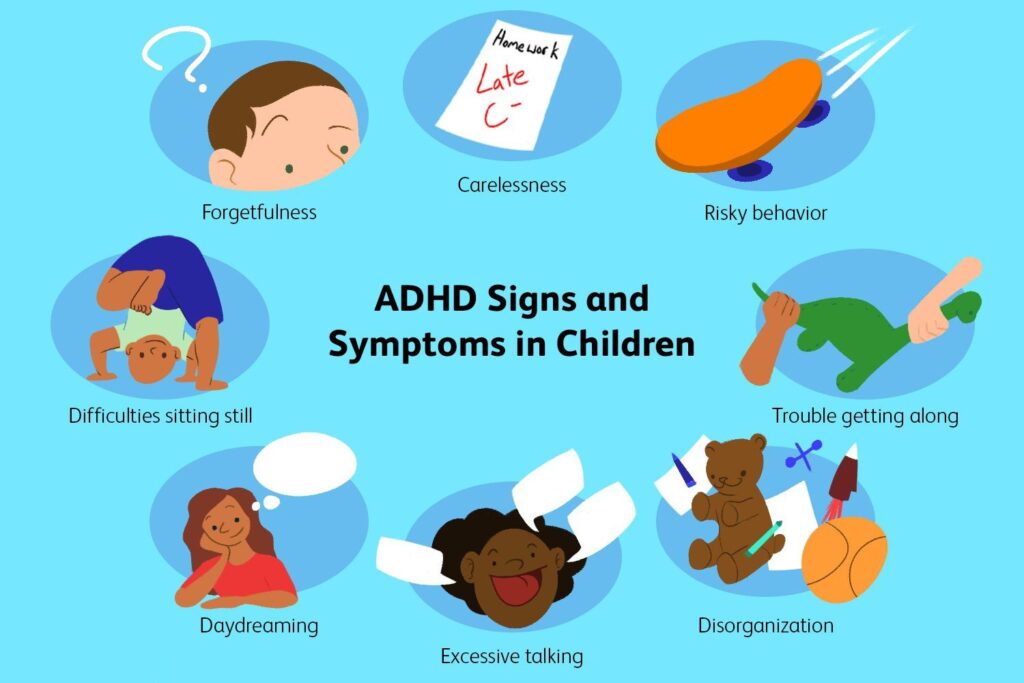Keeping a close eye on a child’s developmental stages is vital as it profoundly impacts their future trajectory. One challenging condition that can arise during this critical phase is known as ADHD, or Attention Deficit Hyperactivity Disorder.
Understanding ADHD
ADHD poses significant challenges during brain development, affecting a child’s ability to focus and exhibit self-control. If left untreated, it can persist into adulthood, leading to complications.
Symptoms of ADHD
ADHD symptoms vary from child to child and should not be overlooked:
Easily distracted
Excessive talking
Difficulty focusing
Forgetfulness
Careless mistakes
Impatience
Causes of ADHD
While the precise causes of ADHD are still under investigation, factors such as alcohol or tobacco use during pregnancy, premature birth, brain issues, and exposure to harmful chemicals may contribute to its onset.
Treating ADHD
Treatment requires a comprehensive understanding of the child’s mental state and may vary in duration:
Behavioral therapy: Combined with medication, this approach addresses ADHD effectively by focusing on essential skills like time management and organization.
Medication: Prescription drugs are tailored to the severity of the condition.
Alternative treatments: Yoga and meditation may complement traditional therapies, depending on the child’s progress.
Early intervention by experienced mental health professionals is crucial for children exhibiting even mild ADHD symptoms. Don’t delay; consult the Best Doctors for ADHD Treatment in Delhi at World Brain Center Hospital for the specialized attention your child deserves.
Frequently asked questions (FAQs) about ADHD:
What are the common signs of ADHD in children?
The signs of ADHD include difficulty focusing, impulsivity, hyperactivity, forgetfulness, and trouble following instructions.
At what age can ADHD symptoms appear?
ADHD symptoms often appear in early childhood, typically before the age of 12. However, they can sometimes be identified in preschool-aged children as well.
Is ADHD a lifelong condition?
ADHD is a chronic condition that often persists into adulthood. However, symptoms may change over time, and with appropriate treatment and support, individuals with ADHD can lead successful lives.
How is ADHD diagnosed?
Diagnosis involves a comprehensive evaluation by a qualified healthcare professional, including a review of symptoms, medical history, and behavioral assessments. It may also include input from parents, teachers, and other caregivers.
What treatment options are available for ADHD?
Treatment for ADHD may include behavioral therapy, medication, educational interventions, and parent training programs. The specific approach depends on the individual’s symptoms and needs.
Can ADHD be managed without medication?
Yes, behavioral therapy and other non-medication interventions can be effective in managing ADHD symptoms. However, medication may be recommended in some cases, especially for moderate to severe symptoms.
What strategies can parents and teachers use to support children with ADHD?
Strategies may include creating structured routines, providing clear instructions, breaking tasks into smaller steps, offering positive reinforcement, and implementing organizational tools and systems.
Are there any long-term effects of untreated ADHD?
Untreated ADHD can have significant long-term effects, including academic underachievement, impaired social relationships, low self-esteem, and an increased risk of substance abuse and mental health issues.
Can adults have ADHD?
Yes, ADHD can persist into adulthood, and many individuals may not receive a diagnosis until later in life. Symptoms of adult ADHD may differ from those in children but can still significantly impact daily functioning.
Where can I find support and resources for ADHD?
Support groups, online forums, educational workshops, and mental health professionals specializing in ADHD can provide valuable support and resources for individuals and families affected by ADHD.


